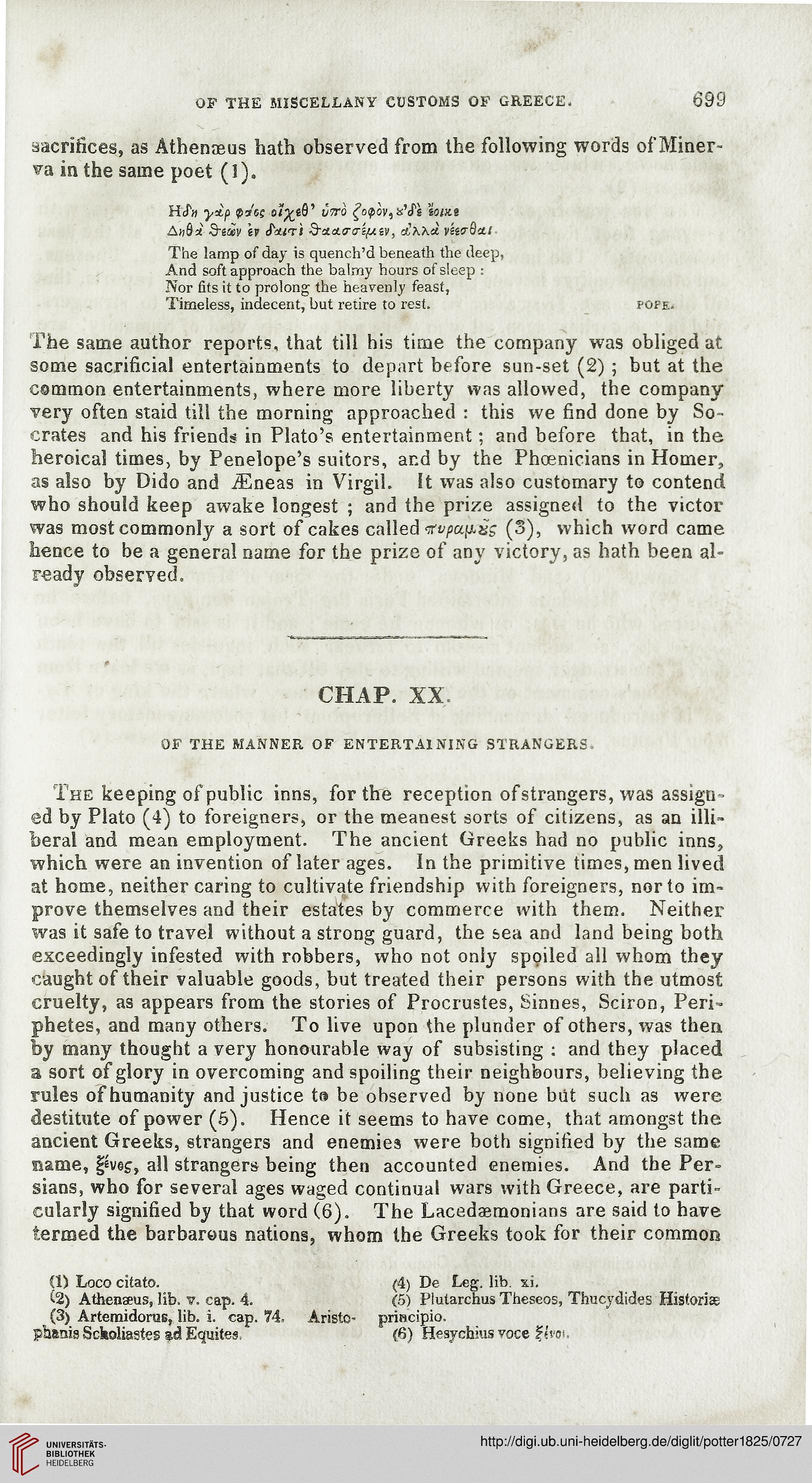of the miscellany customs of greece.
699
sacrifices, as Athenseus hath observed from the following words of Miner-
va in the same poet (1).
HiT» yip pin; s?^«8' v7ro ^opov, ss'ifs tout
A«9i £b«v h fdUTt d-ucta-a-'i/xiv, d\\d vkrQzl
The lamp of day is quench'd beneath the deep,
And soft approach the balmy hours of sleep :
Nor fits it to prolong the heavenly feast,
Timeless, indecent, but retire to rest. pope.
The same author reports, that till his time the company was obliged at
some sacrificial entertainments to depart before sun-set (2) ; but at the
common entertainments, where more liberty was allowed, the company
very often staid till the morning approached : this we find done by So-
crates and his friends in Plato's entertainment ; and before that, in the
heroical times, by Penelope's suitors, and by the Phoenicians in Homer,
as also by Dido and iEneas in Virgil. It was also customary to contend
who should keep awake longest ; and the prize assigned to the victor
was most commonly a sort of cakes called tfvpa^ilg (3), which word came
hence to be a general name for the prize of any victory, as hath been al-
ready observed.
CHAP. XX.
of the manner of entertaining strangers.
The keeping of public inns, for the reception of strangers, was assign-
ed by Plato (4) to foreigners, or the meanest sorts of citizens, as an illi-
beral and mean employment. The ancient Greeks had no public inns,
which were an invention of later ages. In the primitive times, men lived
at home, neither caring to cultivate friendship with foreigners, nor to im-
prove themselves and their estates by commerce with them. Neither
was it safe to travel without a strong guard, the sea and land being both
exceedingly infested with robbers, who not only spoiled all whom they
caught of their valuable goods, but treated their persons with the utmost
cruelty, as appears from the stories of Procrustes, Sinnes, Sciron, Peri-
phetes, and many others. To live upon the plunder of others, was then
by many thought a very honourable way of subsisting : and they placed
a sort of glory in overcoming and spoiling their neighbours, believing the
rules of humanity and justice t» be observed by none but such as were
destitute of power (5). Hence it seems to have come, that amongst the
ancient Greeks, strangers and enemies were both signified by the same
name, i^veg, all strangers being then accounted enemies. And the Per-
sians, who for several ages waged continual wars with Greece, are parti-
cularly signified by that word (6). The Lacedaemonians are said to have
termed the barbarous nations, whom the Greeks took for their common
(1) Loco citato. (4) De Leg. lib xi.
^2) Athenaeus, lib. v. cap. 4. (5) Plutarchus Theseos, Thucydides Historiae
(3) Artemidorus, lib. i. cap. 74. Aristo- principio.
phanis Sckoliastes ad Equites, (£) Heaychms voce $lvo\.
699
sacrifices, as Athenseus hath observed from the following words of Miner-
va in the same poet (1).
HiT» yip pin; s?^«8' v7ro ^opov, ss'ifs tout
A«9i £b«v h fdUTt d-ucta-a-'i/xiv, d\\d vkrQzl
The lamp of day is quench'd beneath the deep,
And soft approach the balmy hours of sleep :
Nor fits it to prolong the heavenly feast,
Timeless, indecent, but retire to rest. pope.
The same author reports, that till his time the company was obliged at
some sacrificial entertainments to depart before sun-set (2) ; but at the
common entertainments, where more liberty was allowed, the company
very often staid till the morning approached : this we find done by So-
crates and his friends in Plato's entertainment ; and before that, in the
heroical times, by Penelope's suitors, and by the Phoenicians in Homer,
as also by Dido and iEneas in Virgil. It was also customary to contend
who should keep awake longest ; and the prize assigned to the victor
was most commonly a sort of cakes called tfvpa^ilg (3), which word came
hence to be a general name for the prize of any victory, as hath been al-
ready observed.
CHAP. XX.
of the manner of entertaining strangers.
The keeping of public inns, for the reception of strangers, was assign-
ed by Plato (4) to foreigners, or the meanest sorts of citizens, as an illi-
beral and mean employment. The ancient Greeks had no public inns,
which were an invention of later ages. In the primitive times, men lived
at home, neither caring to cultivate friendship with foreigners, nor to im-
prove themselves and their estates by commerce with them. Neither
was it safe to travel without a strong guard, the sea and land being both
exceedingly infested with robbers, who not only spoiled all whom they
caught of their valuable goods, but treated their persons with the utmost
cruelty, as appears from the stories of Procrustes, Sinnes, Sciron, Peri-
phetes, and many others. To live upon the plunder of others, was then
by many thought a very honourable way of subsisting : and they placed
a sort of glory in overcoming and spoiling their neighbours, believing the
rules of humanity and justice t» be observed by none but such as were
destitute of power (5). Hence it seems to have come, that amongst the
ancient Greeks, strangers and enemies were both signified by the same
name, i^veg, all strangers being then accounted enemies. And the Per-
sians, who for several ages waged continual wars with Greece, are parti-
cularly signified by that word (6). The Lacedaemonians are said to have
termed the barbarous nations, whom the Greeks took for their common
(1) Loco citato. (4) De Leg. lib xi.
^2) Athenaeus, lib. v. cap. 4. (5) Plutarchus Theseos, Thucydides Historiae
(3) Artemidorus, lib. i. cap. 74. Aristo- principio.
phanis Sckoliastes ad Equites, (£) Heaychms voce $lvo\.





